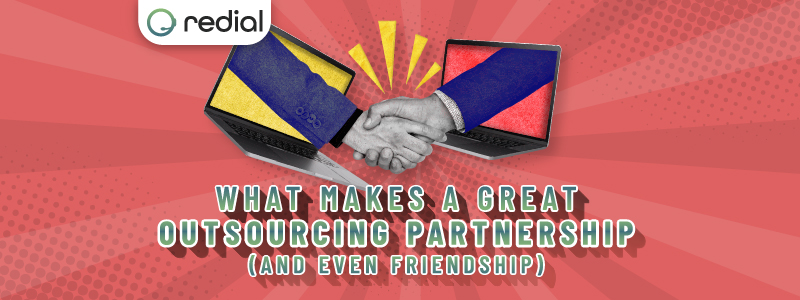What Makes A Great Outsourcing Partnership (and even friendship)
As the term nearshoring keeps popping out on different media outlets, reinforced by constant trade and investment agreements, companies will continue to outsource.
So, in the month of love and friendship, we see fit to talk about the benefits of outsourcing partnerships and how to keep them successful and turn them even into friendships.
Which ultimately relies on development and execution.
This is built on several key elements that work together to create a productive and mutually beneficial relationship.
Here are some of the most important factors that make an outsourcing partnership great for success:
Clear Communication & Trust:
I can’t get enough of saying how communication is vital to any successful relationship, and outsourcing partnerships are no exception.
Both players need to have a clear understanding of expectations, goals, and responsibilities.
Regular check-ins, updates, and open communication help prevent misunderstandings and ensure everyone is working towards a common goal.
But don’t fall into micro-management. Sometimes is hard to let go, but it has been proven multiple times the dangers of certain practices.
And trust is even more essential to build and keep since it’s necessary to work with a trustworthy and dependable partner.
You can consider a proven track record of delivering quality work on time and within budget.
At the end of the day, outsourcing is a way to delegate and rely on professionals to optimize and enhance your services.
Aligned Goals:
Both parties must have aligned goals and a shared vision for the outsourcing partnership.
We consider this important to mention, because sometimes, decision makers maybe don’t consider or just don’t know how a technical or operational subject will be of relevance.
But you could be surprised!
This can help ensure that everyone is working towards the same objective and the partnership is working towards the business’s overall success.
And this must be shared with all departments, reaching not only operations but also the administrative and creative area.
If all teams are on the same page, the workflow will be faster and cohesive.
Shared Responsibility:
Executives should take shared responsibility for the partnership’s success.
This can include providing resources and support, collaborating on strategy, and working closely with the business to meet its goals.
They also must be open to new and creative ideas to execute business needs to innovate and meet client’s demands.
Flexibility:
The best outsourcing partnerships are flexible and adaptable to change.
As business needs evolve, the outsourcing partner should be willing to adjust processes, systems, and services to meet the changing needs of the business.
Expertise:
The outsourcing partner should have a deep understanding of the industry and specific expertise in the areas they are responsible for.
This expertise can help drive innovation, improve processes, and provide valuable insights to the business.
It should also deliver high-quality work that meets or exceeds expectations.
This can help ensure that the outsourcing partnership adds value to the business and contributes to its overall success.
Both parties should approach the outsourcing relationship as a partnership, not just a vendor-client relationship.
Meaning that you have work together to overcome challenges, sharing information and resources, and fostering a collaborative culture.
Final thoughts:
In conclusion, both can create a valuable tool for businesses, but only when executed properly.
This partnership requires all the factors mentioned and even more.
Companies can increase efficiency, drive growth, and achieve greater success by focusing on these critical elements.
Thank you for reading our blog, if you want to learn more about the industry, visit other articles!
Want to contact us or get a better idea on how we can help? Send us a message.



